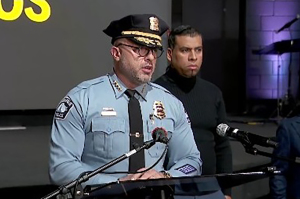Why Is Guatemala Blocking Americans From Adopting Its Orphans?
Six years after Guatemala passed a new law intended to address fraudulent adoptions, children still wait to be united with their adoptive parents. The Christian Post spoke with three adoptive parents who indicated that Guatemalan government officials appear to be blocking them from bringing their children to their new homes.
Ruth Sheehan, Carri and Jason Kern, and J.P. and Donna von Halle all began the adoption process before the "Ortega law" went into effect in January 2008. Guatemala passed the law at the insistence of the U.S. State Department to comply with the United Nations' Hague Convention on Intercountry Adoption.
After the Ortega law was passed, Guatemala shut down all intercountry adoptions (even though the allegations of fraudulent adoptions have never been proven true), thus making the law a tragedy for many of the same children it was supposedly drafted to protect.
Under the law's "grandfather clause," the Kerns, Sheehan and von Halle adoptions should have been completed. Due to some combination of incompetence and/or unscrupulous behavior from Guatemalan officials, their children, who first began the adoption process as babies, are now six to seven years old. Though they have adoptive parents waiting to bring them to new homes, they are living as if they are orphans.
A few weeks ago, Sheehan believed she was close to finalizing her adoption of Tommy (an alias), whom she first met as a baby. She has been the only mother he has known. Sheehan was to appear before Judge Mena in a children's court, which had a reputation for moving orphan cases fairly and smoothly.
Judge Mena was removed, though, and replaced by another judge before an Oct. 30 hearing. At that hearing, an attorney for the PGN (Procuradoria General de la Nacion), a Guatemalan agency in charge of adoptions, inexplicably tried to derail the adoption.
He asked the judge to remove Sheehan from the proceedings and the new judge complied, even though, under Guatemalan law, Sheehan had been declared a third party to Tommy's case and had a right to be at the proceedings. (The Christian Post was provided documentation showing that Sheehan is a third party in the case.)
"My reason for existence and my mission in life is to save this child," Sheehan told The Christian Post.
The Kerns' case also appears shady. The Kerns first met Hudson when he was two months old, in the fall of 2007, before the Ortega law was passed. Though their adoption should have moved forward under the law's grandfather clause, the PGN decided their adoption required additional scrutiny. The birth mother needed to be interviewed, the PGN said, before the Kerns could adopt Hudson.
A PGN official said they were searching for the birth mother, but could not find her, but she still needed to be interviewed for the adoption to be completed. In 2009, the Kerns decided to hire a "searcher" to find the birth mother.
The search turned out to be a lot easier than expected. The birth mother was at the home address that appeared on her official ID card. Either the PGN officials inexplicably never looked for the birth mother at her home address, or they never looked for the birth mother, as they claimed.
In April, Carri Kern went to Guatemala for a meeting with the PGN, and to try to bring her son home. The PGN official told her that the birth mother had been visiting Hudson, so he recommended reunification with the birth mother.
Kern knew that was not true, so she pressed him – how did he know the birth mother was visiting? The official claimed that the orphanage told him. Hudson, though, does not live in an orphanage. He lives with a foster family. The foster family says that the birth mother has never visited, or tried to visit, Hudson.
The Guatemalan official was "making things up to sabotage the adoption," Kern said.
The von Halles also began their adoption before passage of the Ortega law. Christian had already received a Certificate of Abandonment before the von Halles decided to adopt him when he was 18 months old. Christian is now seven and still waiting to be united with the only family he has known.
The PGN has not allowed the adoption process to be completed, they say, because they must complete their investigation and exhaust all opportunities to unite Christian with Guatemalan relatives. The von Halles are now in the final stage of the process which, they have been told, will take another six to nine months. In the meantime, they worry about Christian because he has been moved to a large, overcrowded state-run orphanage.
The von Halles try to visit Christian as often as they are able and have traveled to Guatemala 13 times. Each time, though, they must get approval from a judge and their visits are limited to two hours.
"We are the only family he has ever known and we won't give up on him, no matter how many hurdles are thrown in our path – and there have been many!" Donna von Halle told The Christian Post. "Hard to imagine why anyone would want to keep a child living in an institution when he could be in the care of a permanent, loving family."
On Nov. 5, Sens. Roy Blunt (R-Mo.) and Mary Landrieu (D-La.) sent a letter to Guatemalan Minister of Foreign Affairs Luis Castro warning that they would act to restrict U.S. foreign aid to Guatemala if the country does not move to quickly resolve the remaining intercountry adoption cases.
According to the letter, 25 children have been united with their American families over the past year, but 68 cases remain unresolved. Cases have been stalled through backlogs, or have no scheduled hearings, Blunt and Landrieu wrote. They also expressed concern about the removal of Judge Mena.
"These delays are very troubling and we urge the Government of Guatemala, and the Guatemalan judiciary in particular, to prioritize the completion of these cases in the best interests of the children," they wrote.
A bill passed out of the Senate Appropriations Committee will, when it becomes law, require "swift resolution of all remaining intercountry adoption cases involving Guatemalan children and American prospective adoptive parents," or U.S. assistance to Guatemala will cease on Jan. 15.
Kern said she hopes the Blunt and Landrieu letter will help resolve her case so she can bring Hudson home.



























